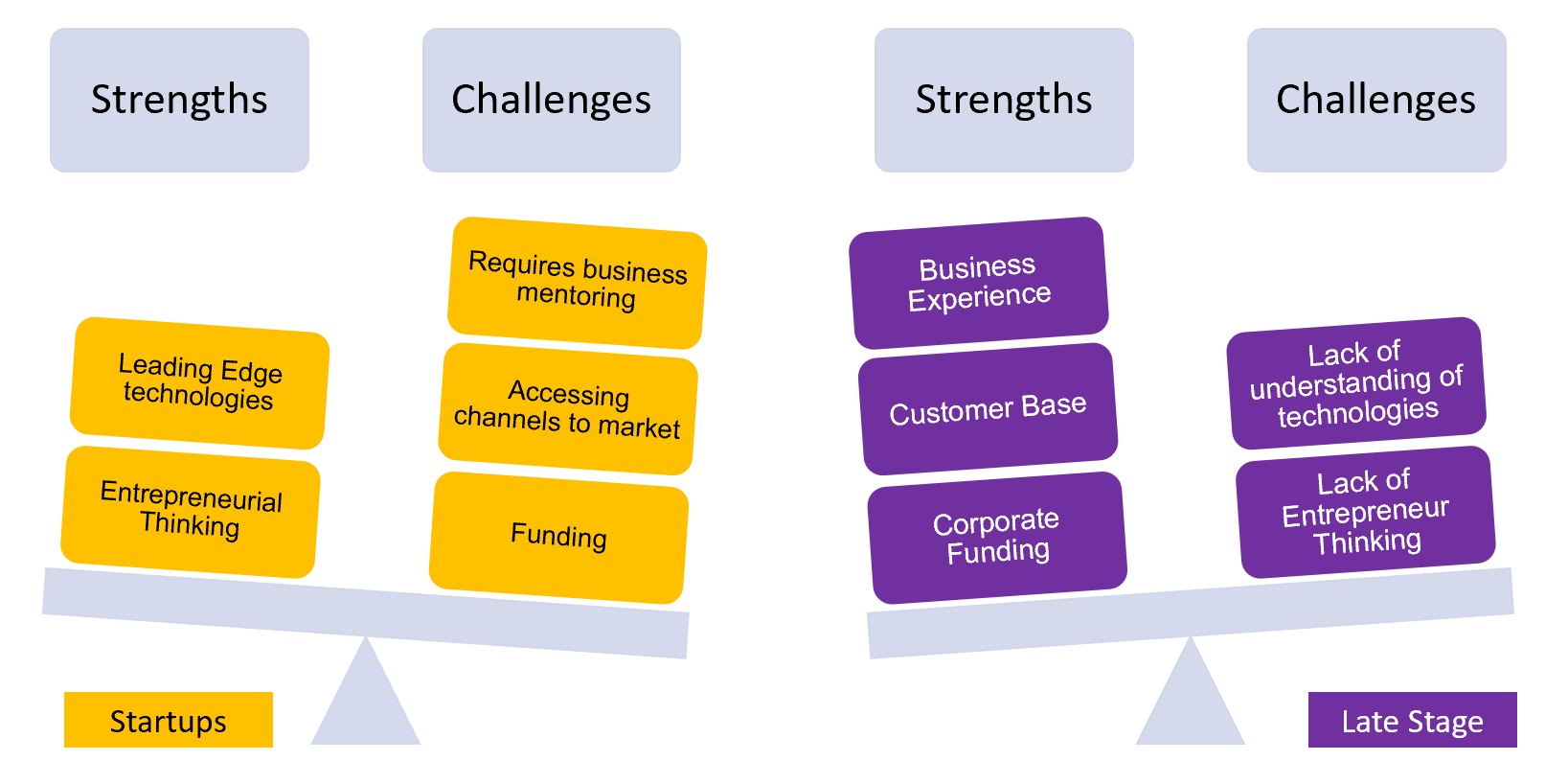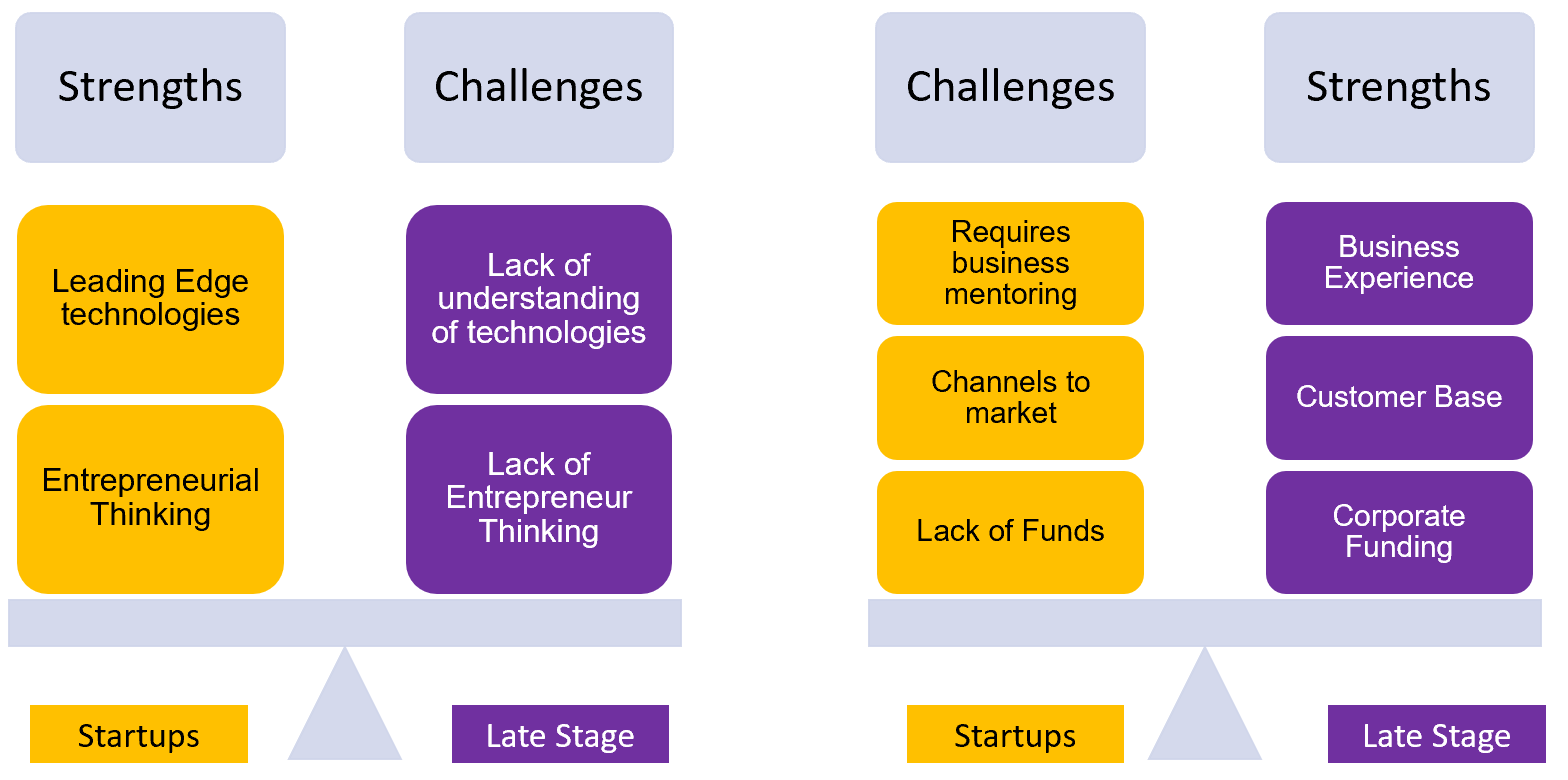CEO’s of startups and large enterprises – magic can happen when you come together.
One of the digital transformation challenges in large organisations is knowing how to work with startups and often, without intention, large organisations can be startup killers. This happens in a few ways:
- when the partnership works at corporate pace, rather than fostering the pace and working styles of a startup,
- when the partnership is unable to move to an agile funding model. Many startups are operating with a short runway, and traditional milestone-based funding makes it difficult to operate,
- when startups ‘do anything’ asked by the enterprise. The enterprise asks because they value the startups entrepreneurial approach, but the unintended consequence is the startup deviates its focus compromising their initial value proposition.
When it works – it really works!
Despite these challenges, this is almost a perfect relationship, as the challenges of each company can be solved by the strengths of the other.
Let me explain, in isolation each company has its own strengths and challenges as per the illustrative example below:

Yet, when we can navigate how to work together, we create balance, and with balance comes success.

What this illustrates is:
- An early-stage company has entrepreneurial and diverse thinking, with a solid understanding of emerging technologies. This is a challenge for large organisations to achieve with limited resources and the constant pressure of business-as-usual inhibiting innovative thinking and creativity.
- An early-stage company is challenged with funding that is usually available within a larger organisation, albeit this organisation may need independent coaching on how to invest in innovation with a ‘spend a little to learn a lot’ and ‘fail fast’ mentality.
- Many startups do not have complex industry knowledge and may need industry exposure. It’s simple really, welcome them to spend time in the business, startups are hungry for knowledge and I guarantee they will very quickly see opportunities in a way that may not have been considered before.
- Finally, access to a market channel can be a challenge for startups, yet channel penetration is essential for their growth. Larger organisations can offer great access to their customers opening channel development for startups.
CEOs and Boards, you have a key role
Whilst I have said this is a good match, it is not a natural match, and the key to this relationship being successful is deeply anchored in trust which comes from an agreed partnership approach, right up front.
Organisations looking to harness the power of startups should invest in talent that know how to work successfully with startups, to scout, engage and deliver. This understanding needs to be an agreed way of working from the CEO and the Board, as whilst there may be pockets of the business able to work in this way, if the flexibility and mindsets do not come from the top, it will fail.
This doesn’t mean the board should be across the detail as I think this may be counterintuitive, but the board must express a clear mandate and principles to ensure the best can come from these partnerships. A business should be clear on its risk and investment appetite as part of the transformation journey. This offers clarity to the startups around the nature of the relationship with an organisation and moves away from the dreaded ‘waiting for board meeting decisions’ which dilutes the value of the partnership.
At a personal level, some directors may also like to consider offering mentoring to startups or offer connections to their networks. I believe we should foster startups to cultivate and accelerate digital growth in New Zealand and would encourage leaders to share some of their time with startups they feel align to their purpose.
Final thought, have you thought about disrupting on a larger scale in a co-lab?
What if you were not just solving a problem for your business but solving an industry problem? I have worked with many organisations that are passionate about solving problems, but to disrupt at scale they realise they are not able to go alone.
These organisations have opened their doors to other large industry players looking to solve the same problem, and to startups with a potential solution to all or part of the problem. Whilst there does need to be an orchestrating company, the collective group co-design, co-invest and accelerate time and scale of market penetration.
If this concept is interesting, then get in touch and I can help you navigate launching a co-lab.
About UpSw!ng

The content in this series is my perspective, open to discussion and healthy challenge, and welcomes ideas and collaboration should you wish to get involved.
It is my objective to represent diverse thinking and inspirational leadership towards a fundamental shift in the way technology and innovation can grow profitable NZ organisations, whilst making positive impacts on society.
What may feel dramatic now, will be considered visionary in the future!
Ready to take action?
I would be delighted to help you with your digital growth, get in touch at to start taking action, not just promoting a vision!
#globalmindkiwiheart

